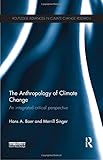The anthropology of climate change an integrated critical perspective Hans A. Baer and Merrill Singer
Tipo de material: Libro
impreso(a)
Idioma: Inglés Series Detalles de publicación: London Routledge Taylor & Francis Group Earthscan from Routledge c2014Descripción: viii, 244 páginas 24 centímetrosISBN:
Libro
impreso(a)
Idioma: Inglés Series Detalles de publicación: London Routledge Taylor & Francis Group Earthscan from Routledge c2014Descripción: viii, 244 páginas 24 centímetrosISBN: - 0415735904
- 9780415735902
- 304.25 B3
Bibliografía: páginas 212-239 e índice temático: páginas 240-244
In addressing the urgent questions raised by climate change, this book provides a comprehensive overview of the anthropology of climate change guided by a critical political ecological framework. It argues that anthropologists must significantly expand their focus on climate change and their contributions to responding to climate change as a grave risk to humanity. The book presents a human socioecological framework for conceptualizing climate change. It examines the emergence and slow maturation of the anthropology of climate change; reviews the historic foundations for this work in the archaeology of climate change; and presents three alternative contemporary theoretical perspectives in the anthropology of climate change. The book synthesizes anthropological work and perspectives on climate change in the form of case studies in various regions of the world revealing the nature of global climate change as constituting multiple and somewhat diverse changes in local settings. It explores the applied anthropology of climate change in terms of the ways anthropologists are contributing to climate policy, working with communities on climate change issues, as well as within the climate movement both internationally and nationally. Finally it provides an overview of what other the social sciences are saying about climate change and explores ways that the anthropology of climate change can interface with sociology, political science, and human geography in order to create an integrated social science of climate change. This book gives researchers and students in Environmental Anthropology, Climate Change, Human Geography, and Sociology, a novel framework for understanding climate change that emphasizes human socioecological interactions. Inglés


